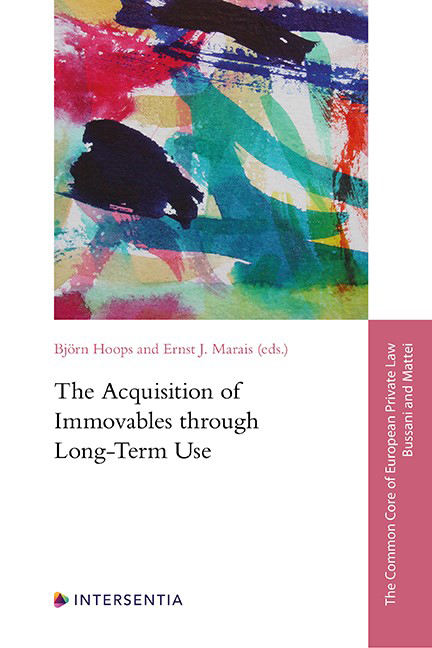Book contents
- Frontmatter
- General Editors’ Preface
- Preface
- Contents
- List of Cases
- Table of Legislation
- List of Abbreviations
- List of Contributors
- Case PART I INTRODUCTORY MATTERS
- PART II CASE STUDIES
- PART III GENERAL CONCLUSIONS
- Appendix I Instructions for the Project on the Acquisition of Immovables through Long-Term Use
- Index
General Introductions
Published online by Cambridge University Press: 26 May 2022
- Frontmatter
- General Editors’ Preface
- Preface
- Contents
- List of Cases
- Table of Legislation
- List of Abbreviations
- List of Contributors
- Case PART I INTRODUCTORY MATTERS
- PART II CASE STUDIES
- PART III GENERAL CONCLUSIONS
- Appendix I Instructions for the Project on the Acquisition of Immovables through Long-Term Use
- Index
Summary
This chapter contains General Introductions written by each national reporter describing the rules on the acquisition of land through long-term use in his/her respective jurisdiction and their context. The editors asked for these to be prepared with specific aims in mind.
First, the General Introductions ‘set the scene’ for the more detailed solutions to the cases. To this end, reporters discuss more general matters regarding the acquisition of land through long-term use that they believe the reader should know about their legal system in advance. Starting with a country-specific introduction helps the reader to understand the answers to the questions better.
Second, the General Introduction provide a frame of reference for the reader. The reporters extensively deal with vital and recurring concepts that would otherwise have to be explained in each answer.
Third, they provide reporters with an opportunity to inform the reader of the cultural particularities of their respective legal systems without being confined by the parameters of questions and cases. It compensates for the reporter’s experience that the inescapable presumptions of the questionnaire have a restrictive effect on his/her answers.
ALBERTA, CANADA
The acquisition of rights in real property through long-term use is made possible in the Canadian province of Alberta through the law of adverse possession. Now abolished in some of the Canadian provinces (altogether, or only in respect of land under Torrens or land titles registration), the doctrine of adverse possession allows a person who occupies land to defeat a claim by the registered owner of the same if the occupant’s possession is of the correct quality and duration. In Alberta, adverse possession takes the form of a defence that is available to a trespasser against an action to recover possession of the land by the registered title holder. The law is born of common law and statute: the requirements of possession (i.e., the factum and animus possidendi) are developed in the case law, while the running of the clock and the priorities of the title holder’s and trespasser's claims are governed by the Limitations Act and the Land Titles Act.
- Type
- Chapter
- Information
- The Acquisition of Immovables through Long-Term Use , pp. 43 - 92Publisher: IntersentiaPrint publication year: 2022

